Erstellt am: 4. 3. 2013 - 16:44 Uhr
Keeping the "Free" in Freeskiing
A windless, cloudless day on the Kitzsteinhorn glacier above Kaprun presents the perfect conditions for a gala performance of freeskiing acrobatics at the 11th edition of the Austrian Freeski Open. I've been coming to this event for a few years now and it seems that the tricks are becoming ever more elaborate.
This year, US skier Nick Goepper, visiting Kaprun for the first time, pulls off the winning run with a routine that highlighted a trick called a “switch double misty”. Just hearing him describe it makes me feel dizzy: “A switch double misty is where you go off backwards and you throw your momentum forward over the jump and spin around three and a half times and do two flips and grab your skis.” That is an insane feat and only one element of a run consisting of five obstacles.
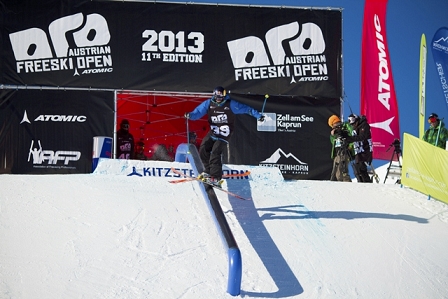
Tom Bause
Mehr Sportgeschichten auf fm4.orf.at/sport.
The freeskiers are true athletes and yet, here in Austria at least, they have largely been ignored by mainstream sports coverage. But that might all change when the slopestyle and half-pipe skiers make their Olympic debuts alongside the snowboarders at the Sochi Olympics which get underway in less than 12 months' time. The promise of medals and the glare of the world's TV cameras has heated up competition in this lifestyle sport: “With the Olympics coming up, it's getting a lot tighter and runs are getting more technical and more diverse,” says Goepper. “It's going to be fun and interesting this next year.”
Will the Olympics prove making of the still relatively young sport of freeskiing as a spectator sport? Will the new broader public fall in love with the scene? It's arguably more exciting to see a skier tumbling through the air than carving around a pole, but instead of split-times, which are instantly comprehensible, you have the wait for the judges' decision. For the casual spectator it is hard to tell with the naked eye what separates a good run from a winning run. What are we looking for?
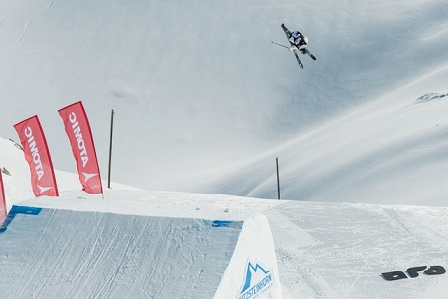
Matthias Rhomberg
The second placed rider at the Austrian Freeski Open was James “Woodsy” Woods from Great Britain who scored highly for a perfect landing on a Right Double Cork 1260 Truckdrive. He gave me a rather esoteric guide to picking a winner: “I think that the way to start looking at which run you think was the best was the run that you got the best feeling from because all the tricks are incredibly difficult, everyone is on such a high level that is basically about putting the biggest smile on the crowds face.” But along with technical difficulty and ambition, the judges are looking for fluidity and “cleanness” meaning that a tiny mistake can mean a plunge down the rankings.
Of course any sport reliant of the expertise of judges will leave room for debate and controversy. “Sometimes you definitely get surprises,” says Norwegian rider Andreas Hatveit, the winner of the Austrian Freeski Open in 2011 and 2012 and a favourite to make a medal at Sochi, “You have no idea really. Sometimes they see something that they think they saw and didn't and you never know what they think.” But generally things even themselves out and at the end of the season the most successful skiers on the World Tour are genuinely recognised to be the best skiers in the world.
Besides, in an admirable expression of British fair play, Woodsy adds that “you can feel however you like about the judges' decision but at the end of the day you can't argue. You can go to them and ask them to explain their decision if you want the feedback to improve your own skiing, but it's like the referee in football: everyone hates that football player that goes and argues with the ref.”
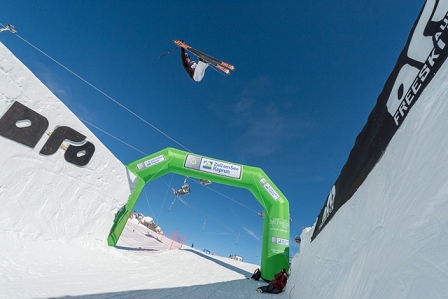
matthias Rhomberg
As I speak to Woodsy, several riders come and slap him on the back or whisper jokes in his ear. This is a lifestyle sport proud of its relaxed, matey atmosphere. It is nice to think of it as an antidote to the win-at-all-cost cut-throat-philosophy of more mainstream sports. Yet with competition getting ever tighter and lack of success meaning not only lost pride but perhaps lost sponsorship and lost livelihoods, I wonder how much of it is genuine.
McRae Williams, a US rider who skied to third place at the Austrian Freeski Open 2013 gives me a little insight “I think on the outside everyone is wishing each other good luck but on the inside part of you is saying ‘Fall! Fall! Fall!’” he laughs, before correcting himself. “No it's not exactly like that: we are all good friends, we love each other and we are stoked to be shredding together.”
So how will the exposure of Olympics limelight impact this alternative sport? Martin “McFly” Winkler, the organiser of the Austrian Freeski Open says that “it will change a great deal. A lot of people who previously knew nothing about our sport will see the action for the first time. I'm sure they will be a lot of developments in the coming years.
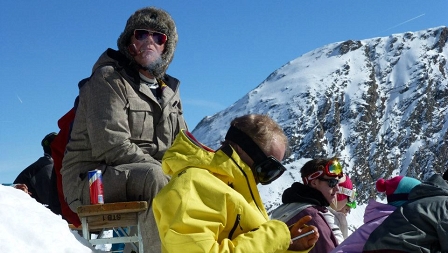
chris cummins
The best Austrian hope for a medal, Luca Tribondeau, freshly crowned as national champion on the Kitzsteinhorn at the tender age of 16, is looking forward to the big event. “I don't know yet if I will be in the team but if I am I will try and do my best. It's exciting. It has always been a dream to compete at the Olympics.
There is, however, a danger inherent in being granted Olympic status for a lifestyle sport like freeskiing. The German, Nico Zacek, who was the winner of the first ever Austrian Freeski Open and who is now a very vocal commentator on the European circuit, says that the impact of the upcoming Olympics is already being felt: “Everybody wants to be part of it. There are a lot more qualifying events and the athletes are under a bit more pressure this year.”
Is the breezy, relatively carefree era of the sport's innocent adolescence about to end? How do you keep the “free” in freeskiing when it crashes into the juggernaut of Olympic regulation.
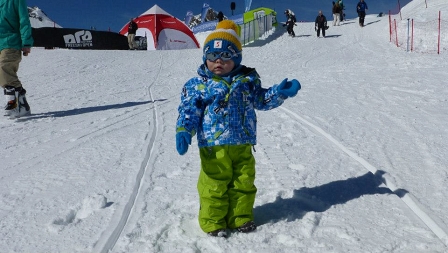
chris cummins
McFly admits it is a worry. “It's a controversial subject. Our sport grew up and developed out of a very free structure and the Olympic Games, and FIS. (the International Ski Federation) lives from rules and regulations. Everything is structured from the top to bottom. That doesn't really reflect the sort we built up and are fighting for. Keeping the spirit alive will be a big issue in the future and I hope that the official and decision makers in the Olympic Committee and at FIS trust us and listen to us when it comes to shaping the future of the sport.”
MyFly and Zacek, who have watched the sport grow and pushed its development, could be seen as concerned parents. The younger competitors seem to worry less about the shadows of mass exposure.
Luca Tribondeau says that “we've always had the X-games which were always sort of like the Olympics of our sport, and now we have the real Olympics. I don't think it will change us.” Emma Dahlström, a 20 year old Swede currently in Austria for this month's Nine Queens event says she sees the Olympics as a huge opportunity. “It was nothing that I dreamed about when I started with this sport but I think it will give a lot more coverage to our sport which is something we deserve.”
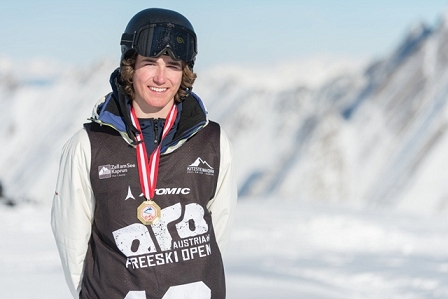
Matthias Rhomberg
“It is going to benefit everyone in the sport,” says Woodsy, “All we have to do is to hold on to our roots and stay true to who we are and why we started this sport. I feel very privileged to have been part of this sport before the Olympics and I feel even more privileged that I will hopefully be part of the first Olympics.”
Andreas Hatveit says he sees it as “just another big contest” but admits he is a bit worried about the course. The X-Games took ten years to get the right course and they are going to try and get it right in just one shot.”
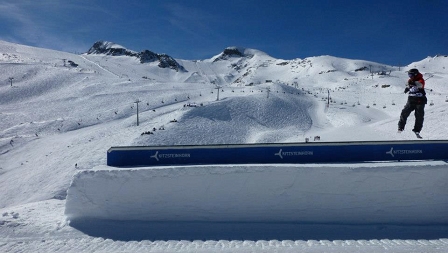
chris cummins
There are other worries too. The Olympic freestyle ski and snowboard competitions will be held at Krasnaya Polyana. The planned trial run in February was cancelled because of a lack of snow with heavy rain and temperatures of around 15 degrees centigrade reducing the carefully shaped course to a mess of dirt and slush. It requires consistent cold temperatures to build Slopestyle jumps and to ensure that they hold shape. The organisers say technologies will enable organizers to “cope with any challenges of the weather” but it's likely that freeskiing action will not be the only thing that is hot about the Olympics being held in Vladimir Putin's treasured Black Sea resort Sochi.


